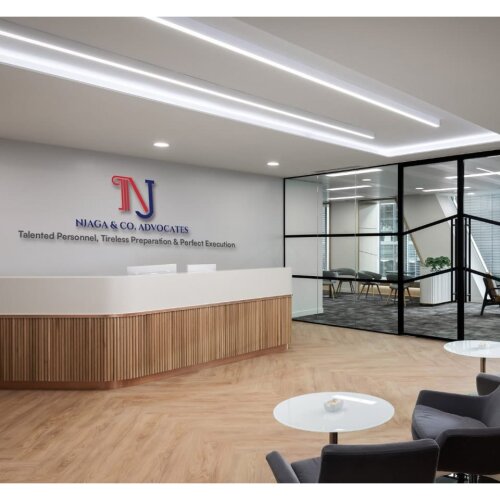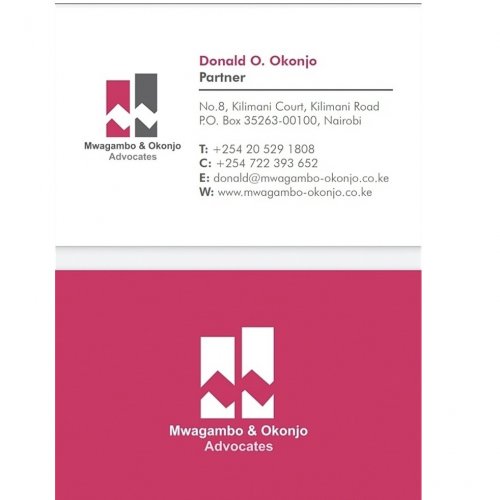Best Data Center & Digital Infrastructure Lawyers in Kenya
Share your needs with us, get contacted by law firms.
Free. Takes 2 min.
Or refine your search by selecting a city:
List of the best lawyers in Kenya
About Data Center & Digital Infrastructure Law in Kenya
Data Center and Digital Infrastructure law in Kenya is a specialized area focused on the regulatory, contractual, and compliance issues surrounding the development, management, and use of data centers and related digital infrastructure. This field is vital as Kenya continues to emerge as a regional technology hub, attracting global investment in data storage, cloud computing, and broadband services. Data centers are physical facilities that organizations use to house their critical applications and data, while digital infrastructure refers to the broader ecosystem enabling digital operations, including fibre optic cables, cloud platforms, servers, and network connectivity. Due to the sensitive nature of data handled and transmitted, there are strict legal and regulatory requirements governing this sector.
Why You May Need a Lawyer
Engaging with data centers and digital infrastructure in Kenya often involves navigating complex legal frameworks. Here are common situations where legal advice is crucial:
- Entering service agreements with data centers or cloud providers
- Ensuring compliance with data protection and privacy laws
- Handling disputes over service level agreements or outages
- Dealing with intellectual property and proprietary technology concerns
- Navigating licensing and regulatory approvals for digital infrastructure projects
- Assessing liability in case of data breaches or cyberattacks
- Resolving cross-border data transfer and localization requirements
- Acquiring or leasing land and negotiating construction contracts for new data center sites
- Understanding the tax, customs, and investment incentives available for ICT projects
- Managing employment law issues regarding specialists managing digital infrastructure
Local Laws Overview
Kenya has enacted several laws and regulations impacting data center and digital infrastructure operations. Some of the most important include:
- Data Protection Act, 2019: Provides a legal framework for the processing of personal data, sets rules on data collection, and requires data controllers and processors to register with the Office of the Data Protection Commissioner.
- Kenya Information and Communications Act (KICA) and Regulations: Governs electronic communications, licensing requirements, and the responsibilities of network and data service providers.
- National ICT Policy: Outlines Kenya’s vision for the ICT sector, including investment in infrastructure and incentives for data center development.
- CERT-Kenya Guidelines: Provides best practices for cybersecurity and incident response for digital infrastructure operators.
- Sectoral Licensing and Environmental Laws: Data center construction and operation may require approvals from bodies such as the Communications Authority of Kenya, National Environment Management Authority, and local county governments.
- Intellectual Property Laws: Address the protection of software, technology solutions, and proprietary data handled by infrastructure providers.
Frequently Asked Questions
What is the role of the Office of the Data Protection Commissioner in Kenya?
The Office of the Data Protection Commissioner enforces the Data Protection Act, ensuring individuals' data privacy, processing registration of data handlers, investigating complaints, and enforcing penalties for violations.
Is it mandatory to register with the Data Protection Commissioner before processing data?
Yes, any organization or individual processing personal data in Kenya must register as a data controller or processor with the Office of the Data Protection Commissioner unless specifically exempted by law.
What are the key legal requirements for setting up a data center in Kenya?
The main requirements include business registration, obtaining sectoral licenses from the Communications Authority, complying with environmental and building laws, and adhering to data protection and cybersecurity regulations.
Can data be transferred outside Kenya?
Cross-border data transfer is permitted but subject to the conditions outlined in the Data Protection Act, such as ensuring adequate data protection standards in the destination country and obtaining consent where applicable.
What penalties exist for breaching data protection laws in Kenya?
Penalties for non-compliance include hefty fines, criminal prosecution, suspension of data processing operations, and civil liability for damages caused by data breaches.
Are international companies eligible to own and operate data centers in Kenya?
Yes, foreign entities can establish and operate data centers in Kenya, though they must adhere to local laws concerning business registration, licenses, employment, tax, and data protection.
What security standards are data centers in Kenya required to follow?
Data centers must implement robust physical, administrative, and technical measures to safeguard data as recommended in national cybersecurity guidelines and international best practices such as ISO standards.
What should I check before signing a contract with a data center provider?
Key considerations include the terms of service level agreements (SLAs), liability clauses, data ownership, compliance with local data protection laws, dispute resolution mechanisms, and exit strategies in case of termination.
How can legal counsel assist during a data breach incident?
A lawyer can guide you on legal obligations for breach notification, assist with regulatory reporting, advise on mitigation steps, coordinate with authorities, and help manage any resulting litigation or penalties.
Are there tax incentives for building digital infrastructure in Kenya?
The Kenyan government periodically provides tax relief and incentives for investment in priority ICT infrastructure, subject to eligibility and approval by relevant authorities like the Kenya Revenue Authority and the Ministry of ICT.
Additional Resources
If you require more information or assistance regarding data center and digital infrastructure issues in Kenya, these organizations and resources can be helpful:
- Office of the Data Protection Commissioner - Responsible for data privacy enforcement and registration
- Communications Authority of Kenya - Regulatory oversight of telecommunications, licensing, and compliance
- Ministry of Information, Communications and The Digital Economy - Policy direction and sectoral guidance
- National Environment Management Authority (NEMA) - Environmental approvals for construction and operation
- CERT-Kenya - Cybersecurity alert and incident handling support
- Law Society of Kenya - Source for qualified legal professionals specializing in ICT law
- African Union and International Standard Bodies - Guidelines on international digital infrastructure standards and cross-border issues
Next Steps
If you are considering establishing, expanding, or operating data center and digital infrastructure services in Kenya and need legal assistance, follow these steps:
- Identify the specific legal issue or area requiring expertise, such as regulatory compliance, contract drafting, or dispute resolution
- Consult with a qualified lawyer or law firm with a proven track record in ICT and data protection law in Kenya
- Prepare all necessary documentation and background information to facilitate a thorough legal review
- Schedule an initial consultation to discuss your needs, potential solutions, costs, and timelines
- Seek ongoing legal advice to ensure continued compliance with evolving local and international laws
Lawzana helps you find the best lawyers and law firms in Kenya through a curated and pre-screened list of qualified legal professionals. Our platform offers rankings and detailed profiles of attorneys and law firms, allowing you to compare based on practice areas, including Data Center & Digital Infrastructure, experience, and client feedback.
Each profile includes a description of the firm's areas of practice, client reviews, team members and partners, year of establishment, spoken languages, office locations, contact information, social media presence, and any published articles or resources. Most firms on our platform speak English and are experienced in both local and international legal matters.
Get a quote from top-rated law firms in Kenya — quickly, securely, and without unnecessary hassle.
Disclaimer:
The information provided on this page is for general informational purposes only and does not constitute legal advice. While we strive to ensure the accuracy and relevance of the content, legal information may change over time, and interpretations of the law can vary. You should always consult with a qualified legal professional for advice specific to your situation.
We disclaim all liability for actions taken or not taken based on the content of this page. If you believe any information is incorrect or outdated, please contact us, and we will review and update it where appropriate.
Browse data center & digital infrastructure law firms by city in Kenya
Refine your search by selecting a city.

















